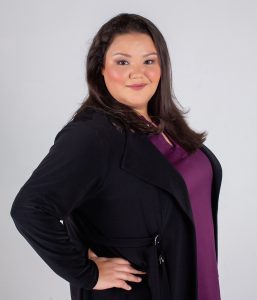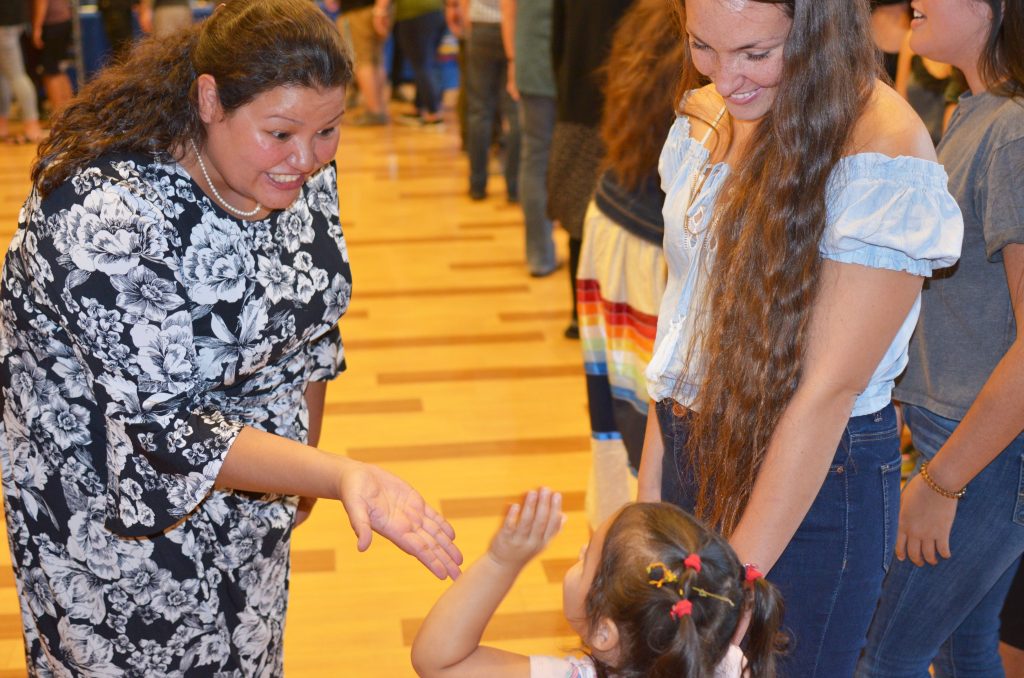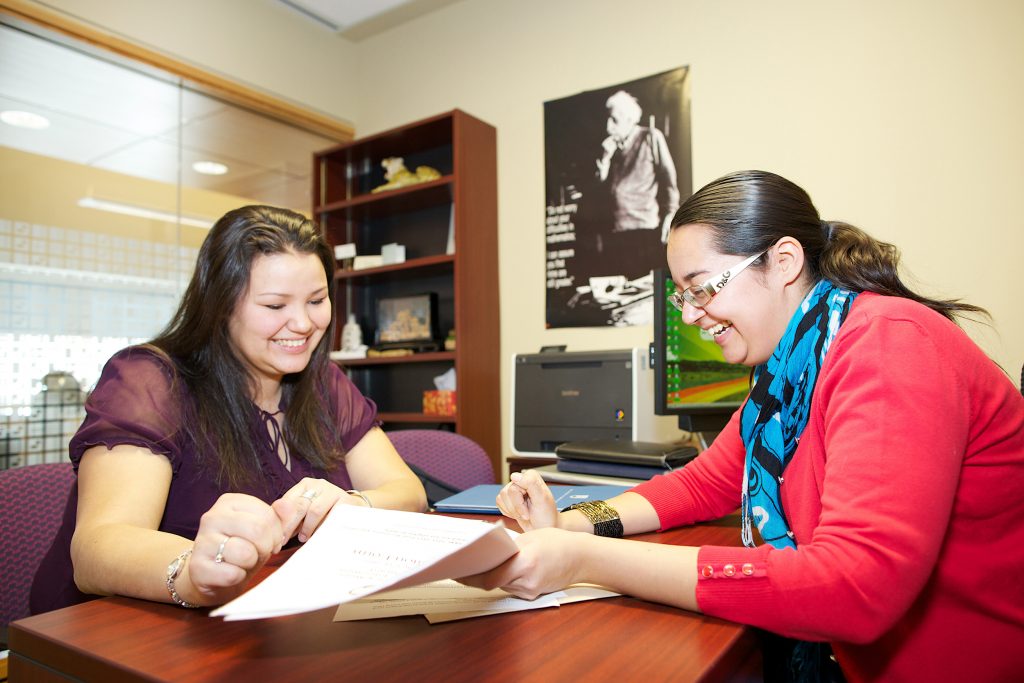Story contributed by Jess Werb

Candice Loring, director of business development with Mitacs, surmounted incredible odds to achieve both academic and professional success. From her start at UBC’s Okanagan campus as a self-professed 27-year-old high-school dropout to her 2016 graduation from the Bachelor of Management (BMGT) program as a Ch’nook Scholar scholarship recipient Loring exemplified persistence, determination and academic excellence. Today, she remains a strong advocate for Indigenous people, and a powerful role model within the UBC and Okanagan communities.
Why did you choose to study at UBC Okanagan?
When I first came to UBCO I was 27, a stay-at-home mom, and a Grade 10 dropout. For me, university seemed like an unattainable dream. But one day I happened to join one of my good friends in a meeting with Dan Odenbach, Aboriginal Program Administrator with Aboriginal Programs and Services. I remember sitting there and, as I listened to Dan, realizing that I could actually get into the Access Studies program. Through the access program, I was accepted into the UBC Okanagan Bachelor of Management Program.
 In my first semester, my mom passed away from cancer just days before my first exams. But because of the incredible support of Aboriginal Programs and Services, and of my professors, I was able to get support. They made accommodations for me so I could deal with the loss of my mother and honor the promise I had made to her that I would continue with my studies. That was always a driving force behind my academic journey.
In my first semester, my mom passed away from cancer just days before my first exams. But because of the incredible support of Aboriginal Programs and Services, and of my professors, I was able to get support. They made accommodations for me so I could deal with the loss of my mother and honor the promise I had made to her that I would continue with my studies. That was always a driving force behind my academic journey.
What did you enjoy most about your time as a student at UBC’s Okanagan campus?
What stands out to me the most is some of the incredible professors I had, who really want to make a difference and guide the next generation of business leaders. My professors really took the time to understand my unique Indigenous perspective, and how valuable it is. Roger Sugden, Dean of the Faculty of Management, also took the time to meet with me to talk about Indigenous ways of learning. Even though I was one of the only self-identified Indigenous students in my class, I felt that my Indigenous perspective was valued.
When I returned to campus as a Mitacs employee, the Faculty of Management was the first one I reached out to. In my first meeting with Dr. Eric Li, he called me a colleague, and that was such a compliment. To come back and have a professor call me a colleague was definitely transformative. After we finish university and we’re armed with all of these skills, we sometimes still feel like an imposter. At that moment, it felt like I’d made it. I didn’t feel like an imposter anymore.
“Even though I was one of the only self-identified Indigenous students in my class, I felt that my Indigenous perspective was valued.”

What about your time at UBC Okanagan was most valuable to your career success?
For me, it was my involvement within the campus Indigenous community. I was president of the Indigenous Student Association for four years, and I was able to work with other Indigenous students on initiatives that we truly cared about—that not only impacted our educational journey, but that would impact the educational journey of future generations. Being a part of a community gave me a sense of belonging, but it also gave me the ability to reach out and connect with other Indigenous students and professors, and create our own community. And my extracurricular activities led me to my first career opportunity.
“I was president of the Indigenous Student Association for four years, and I was able to work with other Indigenous students on initiatives that we truly cared about—that not only impacted our educational journey, but that would impact the educational journey of future generations. Being a part of a community gave me a sense of belonging, but it also gave me the ability to reach out and connect with other Indigenous students and professors, and create our own community.”
In Management, there was much encouragement surrounding the power of networking. As a young mom, I wasn’t able to attend as many Management Student Association events as I would have liked, but my involvement within the Indigenous community network led me to some amazing opportunities. I was recruited into my first job out of university as a Financial Service representative at TD Canada Trust because of my volunteer work with the UBC development and alumni engagement team, where I worked and met with donors to help raise funding for Indigenous student scholarships and opportunities. After a year in that role, I was promoted to Account Manager for Small Business Banking.
I was also recruited to my current position by Dr. Deborah Buszard, UBCO’s former Deputy Vice-Chancellor (DVC) and Principal. I was on the DVC Indigenous advisory committee as a student, and later Dr. Buszard encouraged me to consider the opportunity with Mitacs. I’ve been so fortunate to be presented these opportunities, and it all stems from my student involvement and volunteering.
What does your role at Mitacs involve?
I like to consider myself a “matchmaker” between academia and industry. Mitacs is really the bridge between academia and industry, and my focus is on working with Indigenous organizations and Indigenous academics, both currently underrepresented in research funding. I also work with the Mitacs executive management team on decolonizing our programming and ensuring that we’re not repeating historical wrongs. Mitacs understands that, historically, research was done on Indigenous people and not for and with Indigenous people. We’re committed to changing that narrative to nothing about us without us.
Half of my time is spent within the university connecting with researchers, and the other half is spent connecting with industry and community organizations. When an organization has an innovation or research need, and they’re not sure how to tap in to top talent within post-secondary institutions, Mitacs can assist and help bridge that gap.

What is the most rewarding part of your job?
Having the opportunity to work with businesses and help them realize their needs, and help them create their innovation roadmap, is incredibly rewarding. On the flip side, being able to work with academics and help connect them to industry, and to provide students the opportunity to engage in experiential learning and community-engaged research experience, is incredible. All of the Mitacs projects are so different, so I never have a repetitive work week and I’m constantly learning.
What’s next in your career trajectory?
I think the best opportunities come when you don’t make plans. I didn’t expect to be working for Mitacs, and it has been one of the most incredible journeys I’ve been on. I try not to envision where I will be. I have faith that I’m on the right path, and I look forward to seeing where that path takes me.
Candice’s Top 5 Tips for making the most of your time as a student
1. Get involved.
It doesn’t have to be the typical things you think of, follow your interests. It could even be a sport; someone on your team might happen to be working at an organization that you could go on to work with. None of my network building was ever with the intention of leading to employment. It came from my personal interests, but it led to employment without me even knowing it.
2. Don’t be afraid to approach your professors. They’re dedicated to providing support, encouragement and guidance for all students. Reach out to them, go to their office hours, ask them questions, it means just as much to the professors as it does to the students.
3. Ask for help. I would never have finished university if I hadn’t been able to ask for help. I experienced a great deal of trauma in my personal life during my time at university. I reached out to the many resources available within post secondary. I asked for help when life happened, and there were people lined up with open arms ready to support me.
4. Stay focused on your goals. No matter what happened, I told myself that I couldn’t walk away until I finished that undergraduate degree. I kept my eye on the end goal of having that piece of paper and walking across that stage. Start small, finish the next project, complete the course, finish the term, build in manageable goals that lead towards that end goal.
5. Try to enjoy every step of the way. Your time in university is literally one of the best times of your life. Try not to spend time worrying about what other people think about you or your choices. Just be bold and jump at opportunities. And have fun!